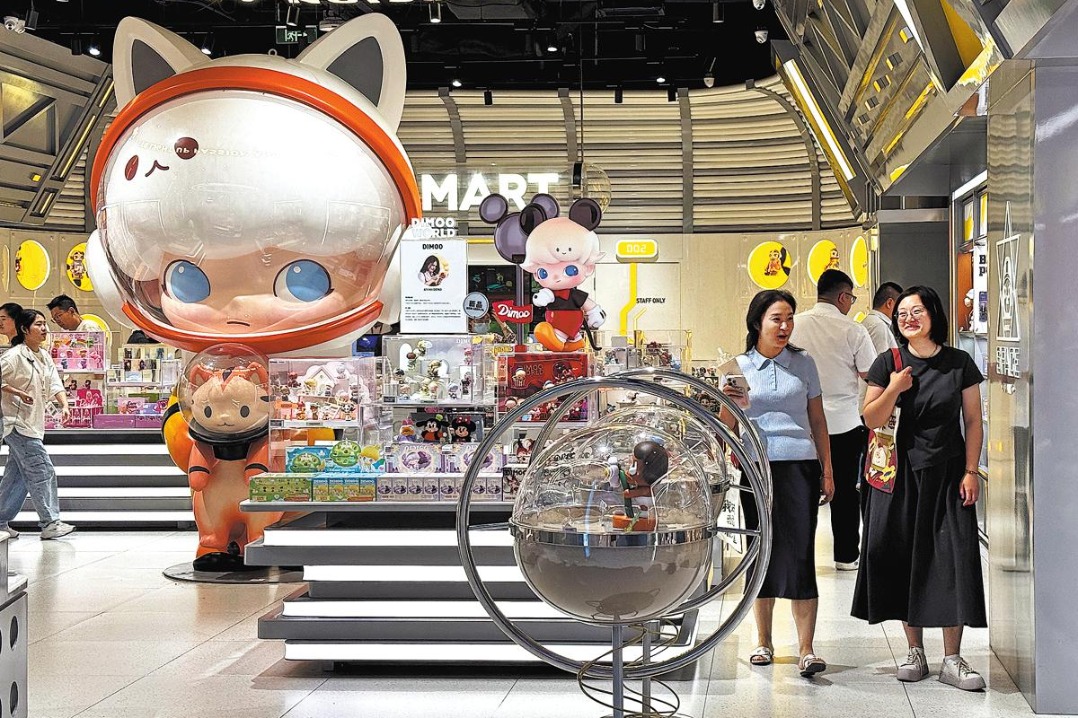Arcade clients claw way to success
By Xu Lin | China Daily | Updated: 2019-04-03 08:45

Snaring toys by machine requires a combination of skill and luck
Rows of toy claw machines can be seen at shopping malls, cinemas and subway stations in China's big cities. Young people surround the machines, some playing them in groups and others alone.
These machines originated from candy dispensers, which appeared in Western countries early in the 20th century and evolved over the decades. They emerged in Japan in the 1980s and were introduced to the Chinese mainland in the 1990s after proving popular in Taiwan.
It is estimated that there are 30,000 such machines in shopping malls that opened in China in 2017, with a market value of more than 9 million yuan ($1.3 million).
In Japan, the claw machine market size reached 11 billion yuan in 2016, with about 150,000 machines, according to Li Yingshi, an analyst from the Qianzhan Industry Research Institute in Shenzhen, Guangdong province.
The items they contain now include sneakers, cakes and snacks. "Japan's claw machines have become a new form of offline retail," she said.
In China, the machines have become popular with young people playing them in arcades with their friends.
Chen Yantong opened a toy claw machine arcade in downtown Beijing with friends in May last year.
"When you hang out with friends, you want to do something interesting in addition to dining. As many Chinese are used to buying clothes online, shopping is no longer a priority to kill time. So what should they do with that extra time?" he asked.
At the store he helped launch, the peak period is 2 pm to 7 pm. "Competition is fierce, and similar shops are emerging," Chen said.
Liang Suya, 28, a photographer from Qingyuan city, Guangdong province, 60 kilometers from Guangzhou, the provincial capital, said: "Many take it for granted that this is just a simple arcade game, but it requires various skills. I enjoy both the soft toys and the process of grabbing them.
"It's a game that requires careful thinking. You make a judgment after careful observation and consideration, including how the dolls are arranged in the machine. I'm really pleased when I figure out an unexpected way to grab a toy."
Liang became interested in playing the machines when she accidentally grabbed a toy duck that she liked. It took her a while to become adept, and her record is successfully grabbing eight toys in 10 attempts.
"While a mobile game provides virtual prizes, playing claw machines offers rewards in a more substantial form. It feels different," she said.
Her friend once posted an online video of her grabbing toys, which became a hit, resulting in more than 12 mainstream media outlets interviewing Liang. In January last year, a short video about Liang's story on the sharing website Pear Video attracted more than 30 million hits and 33,000 comments.
She attributes the claw machine fad in recent years partially to the popularity of video sites, where players share their successes and skills with others.
"People living in small cities have fewer entertainment choices than those in metropolises. Novelties such as claw machines are appealing to young people, especially those who are on a date and who want to have fun," she said.
Wen Ji'er, 22, a writer who has published several books, plays the machines up to three times a week, each session lasting more than two hours. She gets to learn about the latest trends and gossip from her fellow players.
"It's like a cafe. We're close to each other and can hear others chatting," she said.
She once arranged to meet a friend and the friend's partner in a claw machine arcade. Wen believed the couple could get to know each other better by using the machines - for example, whether the young man would be angry if he could not grab a toy.
She said playing the machines is a way to relieve her stress. "I don't like to go to karaoke lounges, pubs or do sports. I like to be by myself and often stay at home in my spare time," Wen said.
"I've loved soft toys since I was a child. It (playing toy claw machines) has turned out to be an efficient way for me to deal with anxiety and pressure."
"You need to be extremely focused to grab a doll by using a claw machine. It's a mixture of excitement and relaxation, and I like the feeling."
Charges for playing the machines in Beijing range from 2 to 5 yuan (30 to 75 cents) for each attempt.
Li, the analyst, said they are often installed at shopping malls, cinemas and subway stations - places where there are large numbers of people and high demand.
"Many in the industry in China are individuals operating on a shoestring. Most stuffed toys are rather ordinary, and only a few are authorized by big companies, making them more expensive," she said.
Chen, who opened a toy claw machine arcade in Beijing, said consumers like dolls they are familiar with, such as those based on emojis.
"It's a good marketing strategy that they can only get the dolls from claw machines. Young people's consumption power should not be neglected," he said.
Wang Biao, founder and CEO of the company 12 Block Culture, is inspired by the Japanese market and wants to see a successful model in China.
"In Tokyo, some copyright stuffed dolls from popular comics are available only from claw machines. I hope the machines will become a major retail channel for products related to comics and animations in China," he said.
The Beijing company specializes in creating emojis for social media platforms such as WeChat. In December 2017, it opened LLJ Station claw machine arcades in cities such as Beijing, Shanghai and Guangzhou. The machines contained the company's stuffed dolls and those authorized by brands in China and overseas.
Limited-edition dolls are not for sale and are only available from the machines, for which customers pay 5 yuan per play. The stores are popular among young Chinese and celebrities such as actress Zhao Liying.
The company invited a Japanese expert to train its staff members in Beijing. The training included instruction on how to interact with customers.

Wang said: "We do our best to make sure our customers have fun and get the dolls they like. Our algorithm ensures that a customer is able to get two dolls at least by spending 100 yuan.
"It's actually a way of selling dolls. When customers are 'buying' them, they enjoy themselves at the same time. If they fail at certain times, a staff member will help to move a doll to a spot where it is easier to grab. We want to make customers happy. They will not feel happy if they cannot grab a doll."
Liang, the photographer, takes a large shopping bag to carry home the toys she wins. She plays the machines once a week and pays 1 yuan for every attempt. She records her expenses and the number of toys she grabs in a notebook. In the past two years, she has spent more than 40,000 yuan on grabbing over 10,000 toys.
She categorizes them carefully and places them in large black plastic bags with written tags, which take up a lot of space at her home.
When she moved to a house next door, it took her two weeks to transfer all her toys by throwing the bags over a dividing wall each day.
Liang said it is not uncommon for diehard fans like her to own such a large number of soft toys. She said fans enjoy themselves by grabbing the toys, but have to watch the numbers as they accumulate.
Some sell their dolls to claw machine owners for a low price or set up stands to sell them on the street. Liang joins benefit activities to sell her dolls and donates the money she gets to those in need.
"Some people don't understand why we spend a fortune on claw machines, and some even think it's squandering money," she said.
"In fact, many are willing to spend a lot of money on something they love. Some people may choose to fly to another city to watch a soccer game, or buy a luxury-brand handbag. Playing a claw machine is no different to this."
























